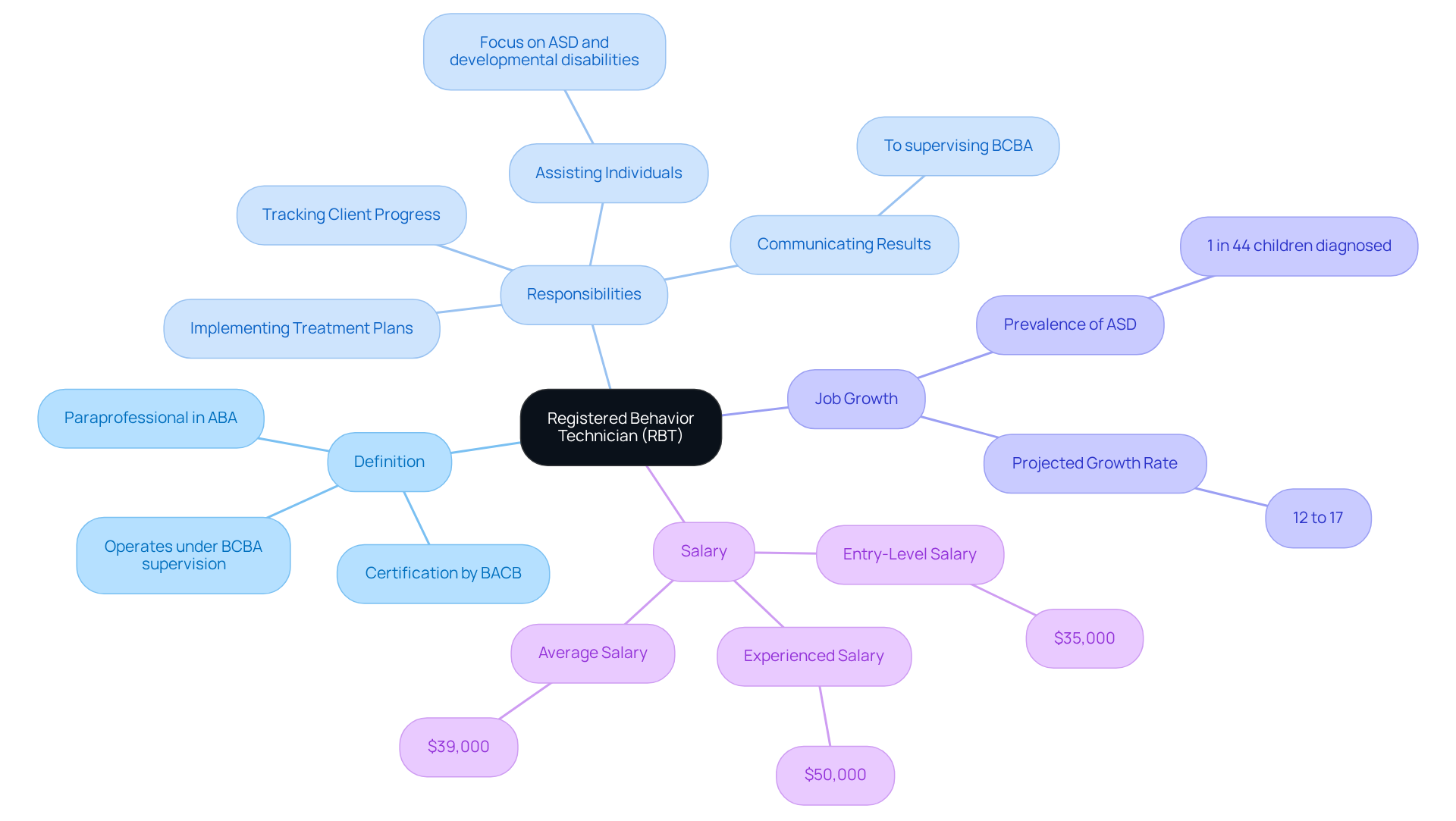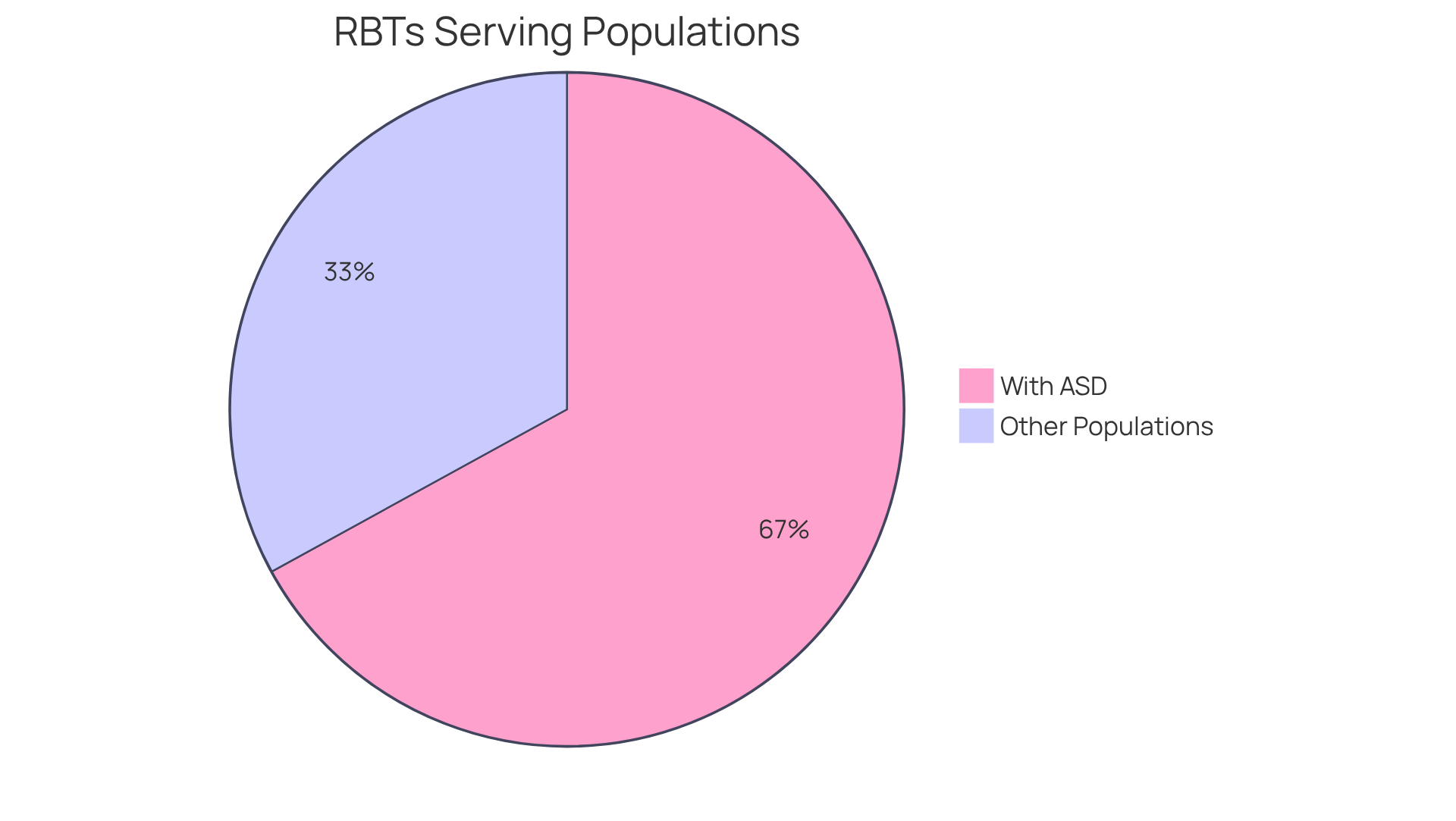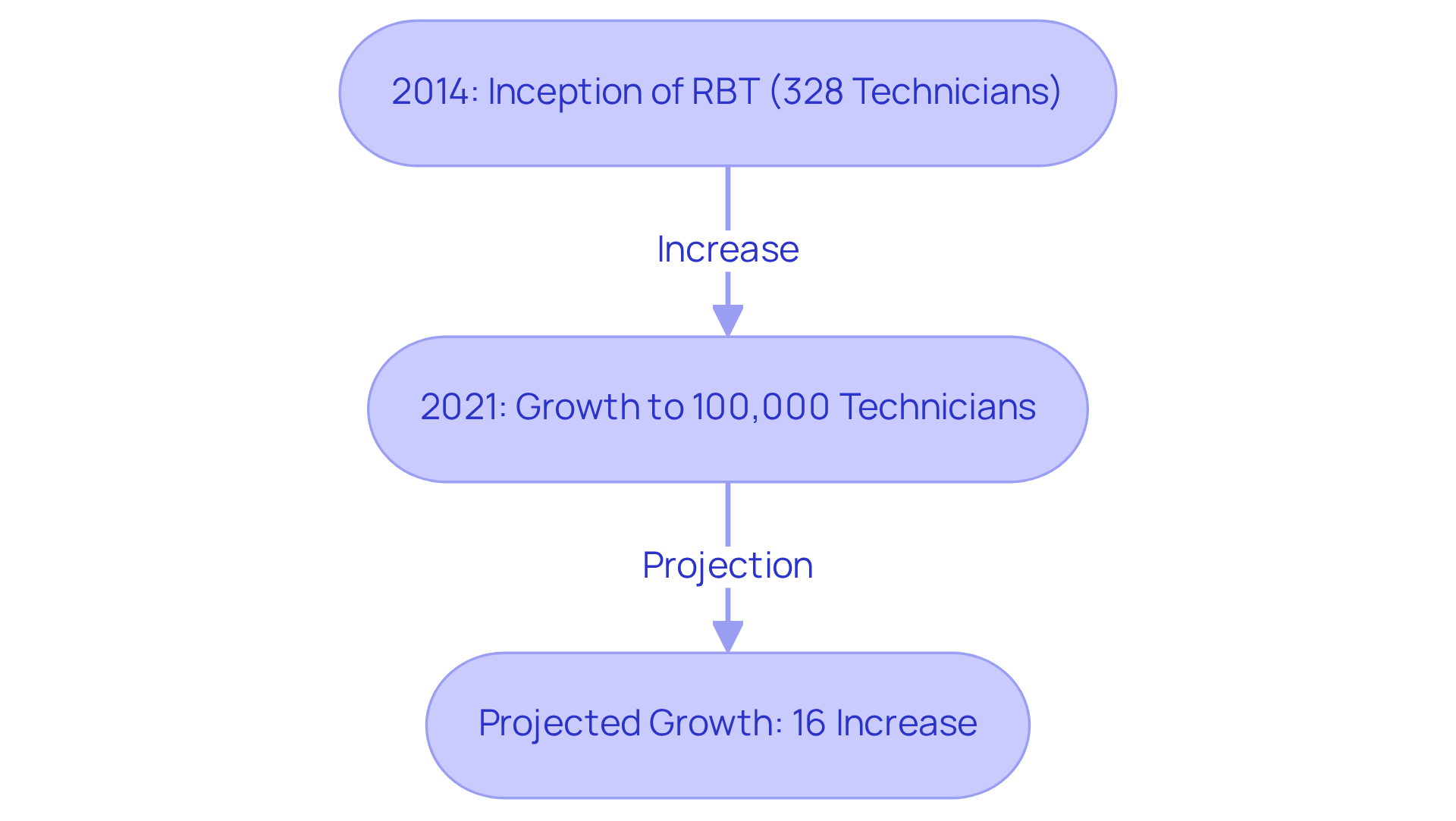August 31, 2025

The article defines a Registered Behavior Technician (RBT) as a paraprofessional trained in Applied Behavior Analysis (ABA). RBTs play a crucial role in assisting individuals, particularly those with autism spectrum disorder, by implementing treatment plans and tracking progress under the supervision of Board Certified Behavior Analysts (BCBAs).
The rising demand for RBTs is underscored by the increasing diagnoses of ASD, highlighting the necessity for standardized training. This growing need emphasizes their critical role in delivering effective behavioral interventions.
The role of Registered Behavior Technicians (RBTs) has emerged as a cornerstone in the field of Applied Behavior Analysis (ABA), particularly as the demand for skilled professionals continues to soar. Did you know that the need for Board Certified Behavior Analysts (BCBAs) is at an all-time high? This statistic highlights the crucial role that RBTs play in the implementation of treatment plans and the support of individuals with autism spectrum disorder and other developmental challenges. As these paraprofessionals undergo specialized training, they become instrumental in delivering effective care.
However, as the number of certified technicians increases, so too does the complexity of their responsibilities and the challenges they encounter. What does it truly mean to be an RBT in today’s evolving landscape of behavior analysis? These professionals must navigate a dynamic environment, adapting to new methodologies and client needs while ensuring the highest standards of care.
In this context, it is essential for healthcare employers to consider how they can effectively recruit and support RBTs. How can platforms like Hire ABA assist in overcoming the hiring challenges faced in this competitive field? By leveraging specialized recruitment services, organizations can enhance their team with qualified RBTs, ensuring that they meet the growing demands of the sector. The reliability of Hire ABA in connecting employers with skilled professionals cannot be overstated.
The RBT definition identifies a Registered Behavior Technician as a paraprofessional who has completed specialized training and certification in Applied Behavior Analysis (ABA). Operating under the close guidance of Board Certified Behavior Analysts (BCBAs), registered technicians play a vital role in delivering analytic services. Their primary responsibilities include:
The RBT definition, which is acknowledged by the Behavior Analyst Certification Board (BACB), guarantees that registered behavior technicians adhere to specific educational and ethical standards in their practice. As of December 2023, there are over 150,000 certified behavior technicians, reflecting the growing demand for trained professionals in the field. This rise is propelled by the increasing occurrence of ASD, with 1 in 44 children diagnosed as of 2021, resulting in a of 12% to 17% for behavior technicians in the coming years. Registered Behavior Technicians must receive oversight a minimum of twice each month, ensuring they deliver high-quality care. The influence of registered behavior technicians on the outcomes for individuals is substantial, as they promote skill development and behavioral strategies that improve the quality of life for those with developmental challenges.
Entry-level registered behavior technicians typically earn around $39,000 annually, while experienced professionals can earn up to $50,000. Are you facing challenges in hiring qualified behavior technicians? Consider the benefits of utilizing Hire ABA for your recruitment needs.

In the realm of Applied Analysis, Registered Technicians are indispensable frontline practitioners delivering direct services to clients. They execute treatment plans developed by Board Certified Behavior Analysts (BCBAs), with a focus on behavior modification and skill acquisition.
These Registered Behavior Technicians exemplify the RBT definition by bridging the gap between theoretical behavior analysis concepts and their practical application across diverse environments. Their impact is particularly pronounced in schools, clinics, and home settings, where they offer tailored support to individuals confronting behavioral challenges.
Notably, according to the RBT definition, around 67% of registered behavior technicians serve individuals diagnosed with Autism Spectrum Disorder (ASD), highlighting their critical role in this domain. With a total of 136,847 Registered Behavioral Technicians in the U.S., the demand for these professionals is on the rise, reflecting the growing recognition of (ABA) as an effective intervention for autism and other developmental disorders.
The Bureau of Labor Statistics projects a 21% job growth rate for behavioral therapists, further underscoring the promising career outlook for registered behavior technicians. Expert insights affirm that these professionals are not only vital in executing treatment plans but also in fostering meaningful relationships with clients, thereby enhancing the overall effectiveness of ABA services.

The demand for qualified professionals in Applied Behavior Analysis (ABA) has surged, with the number of registered behavior technicians skyrocketing from 328 at its inception in 2014 to over 100,000 by 2021. This remarkable growth trajectory underscores the critical role of the RBT definition, which refers to the Registered Behavior Technician credential established by the Behavior Analyst Certification Board (BACB) to standardize training and certification for paraprofessionals in ABA. Prior to the introduction of the RBT credential, inconsistencies in qualifications and training among individuals delivering ABA services were prevalent.
The RBT definition ensures that paraprofessionals have the essential skills and knowledge necessary to provide effective behavior-analytic services under supervision. As the field evolves, the emphasis on [evidence-based practices in ABA therapy](https://pmc.ncbi.nlm.nih.gov/articles/PMC9263038) becomes increasingly vital, particularly for clients with autism spectrum disorder (ASD) and other developmental disabilities. Furthermore, the demand for registered behavior technicians is projected to grow by 16%, highlighting an ongoing need for qualified professionals in this field.
However, challenges remain regarding the geographic distribution of resources, as many regions continue to face shortages of qualified personnel, complicating access to essential services. While ABA therapy is generally effective, it is crucial to acknowledge that should be considered in the context of the RBT definition. Are you prepared to meet the rising demands for qualified ABA professionals? Consider how platforms like Hire ABA can assist in addressing these hiring challenges effectively.

Registered Technicians play a crucial role in the domain of Applied Analysis by executing intervention plans, gathering and examining data on individual progress, and offering direct support in diverse environments. Collaborating closely with Board Certified Behavior Analysts (BCBAs), [registered behavior technicians](https://hireaba.today) ensure that treatment plans are executed with precision and effectiveness. Key traits of effective practitioners include:
Effective communication strategies, such as maintaining open dialogue with parents and caregivers, are essential for fostering a supportive environment and enhancing client outcomes.
The rbt definition highlights that Registered Behavior Technicians are dedicated to ethical practices and ongoing professional development, which is essential for providing high-quality ABA therapy. Statistics indicate that registered behavior technicians significantly contribute to the integrity of behavior analysis, with ongoing supervision mandated to ensure adherence to ethical guidelines and competency in practice. The use of psychiatric technicians, including support technicians, is from 2021 to 2031, emphasizing the rising need for registered behavior technicians.
Entry-level salaries for Behavior Technicians are approximately $47,000 per year, while seasoned Registered Behavior Technicians can earn over $66,000 annually. As the demand for RBTs continues to grow, understanding the rbt definition reveals their indispensable role in providing effective, compassionate care.

The demand for Registered Behavior Technicians (RBTs) is rapidly increasing, underscoring their vital role in the realm of Applied Behavior Analysis (ABA). RBTs are essential pillars that embody a professional standard, ensuring effective and compassionate care for individuals facing developmental challenges. Their responsibilities—implementing treatment plans, tracking progress, and fostering skill development—are particularly crucial for those diagnosed with Autism Spectrum Disorder (ASD).
Key insights into the origins and evolving role of RBTs reveal a narrative shaped by the establishment of the Behavior Analyst Certification Board (BACB) and the growing need for qualified technicians. This underscores the importance of rigorous training, ethical standards, and ongoing professional development. Notably, the statistics highlight not only the expanding career opportunities in this field but also the profound impact RBTs have on enhancing the quality of life for the individuals they serve.
As the prevalence of ASD rises and job growth for behavior technicians is projected to continue, the significance of RBTs cannot be overstated. The landscape of behavioral therapy is evolving, yet the commitment to ethical practices and effective communication remains paramount. Are you facing challenges in recruiting qualified RBTs? Engaging with platforms like Hire ABA can facilitate this process, ensuring individuals in need receive the highest standard of care.
Embracing the role of RBTs transcends merely filling positions; it is about creating a supportive environment that empowers individuals to thrive. Take action now to enhance your recruitment strategy and ensure that your team is equipped to provide exceptional care.
What is a Registered Behavior Technician (RBT)?
A Registered Behavior Technician (RBT) is a paraprofessional who has completed specialized training and certification in Applied Behavior Analysis (ABA) and works under the guidance of Board Certified Behavior Analysts (BCBAs) to provide analytic services.
What are the primary responsibilities of an RBT?
The primary responsibilities of an RBT include assisting individuals, particularly those with autism spectrum disorder (ASD) and other developmental disabilities, in acquiring essential skills, reducing challenging behaviors, implementing treatment plans, tracking client progress, and communicating results to their supervising BCBA.
What standards do RBTs adhere to?
RBTs adhere to specific educational and ethical standards set by the Behavior Analyst Certification Board (BACB).
How many certified behavior technicians are there as of December 2023?
As of December 2023, there are over 150,000 certified behavior technicians.
What factors contribute to the demand for RBTs?
The growing demand for RBTs is driven by the increasing occurrence of autism spectrum disorder (ASD), with 1 in 44 children diagnosed as of 2021, leading to a projected job growth rate of 12% to 17% for behavior technicians in the coming years.
How often must RBTs receive oversight?
RBTs must receive oversight a minimum of twice each month to ensure they deliver high-quality care.
What impact do RBTs have on individuals with developmental challenges?
RBTs have a substantial influence on outcomes for individuals by promoting skill development and behavioral strategies that improve the quality of life for those with developmental challenges.
What is the typical salary range for RBTs?
Entry-level registered behavior technicians typically earn around $39,000 annually, while experienced professionals can earn up to $50,000.
Our expert recruitment strategies and AI-driven sourcing ensure that you receive top-notch candidates quickly, without compromising on quality. Whether you’re looking for BCBAs, Clinical Directors, or RBTs, we’ve got you covered.